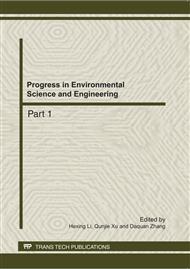p.908
p.914
p.920
p.924
p.929
p.933
p.939
p.943
p.951
State Prediction of Algae Reproduction Based on Learning Algorithm of Fuzzy Nearest Neighbor Clustering
Abstract:
In order to forecast the occurrence of red tide in the ocean, it is necessary to observe the state of algae reproduction in seawater. A method was proposed for forecasting the state of algae reproduction indirectly by modeling to predict the concentration of chlorophyll-a. Data-driven learning algorithm of fuzzy nearest neighbor clustering was used for pretreatment of sampling data. State prediction model for concentration of chlorophyll-a in seawater was built based on the optimal fuzzy logic system. Considering the character of sampling data and the demand of decreasing the rank of the model, a kind of improved learning algorithm of fuzzy nearest neighbor clustering was designed, and it was used in the state prediction for concentration of chlorophyll-a. The experiment indicates that the improved method can effectively extract the character of sampling data, reduce the dimension of the data, and improve the convergence speed of algorithm learning. The improved fuzzy nearest neighbor clustering algorithm reduces the complexity of modeling for prediction, and this kind of model has fine performance of generalization. It can effectively predict the state of algae reproduction in seawater.
Info:
Periodical:
Pages:
929-932
Citation:
Online since:
October 2011
Authors:
Price:
Сopyright:
© 2012 Trans Tech Publications Ltd. All Rights Reserved
Share:
Citation:


